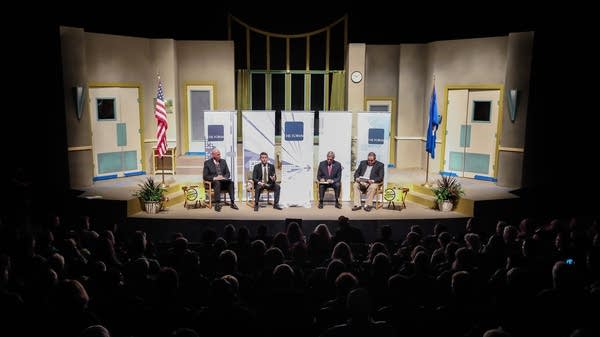Middle class struggles dominate Nolan, Mills MN 8 debate

Go Deeper.
Create an account or log in to save stories.
Like this?
Thanks for liking this story! We have added it to a list of your favorite stories.
DFL Rep. Rick Nolan squared off Monday with GOP challenger Stewart Mills over jobs, health care and Social Security in what's expected to be one of the nation's most competitive and closely-watched congressional races.
The two sparred over mostly domestic issues during the hour-long debate. The attacks in a St. Cloud, Minn., mall over the weekend were not mentioned, nor were the incident's purported links to ISIS. Terrorism was barely discussed.
Instead, both candidates focused on what they would do to help what they both described as a struggling middle class.
"The middle class is getting crushed," Nolan said. "That's really what this election is all about. It's who are you for? Do you want to change the political system that allowed the rich and powerful to fix our politics and our economy at the expense of the middle class?" he asked.
Turn Up Your Support
MPR News helps you turn down the noise and build shared understanding. Turn up your support for this public resource and keep trusted journalism accessible to all.

Nolan said he was for working men and women.
Mills painted an even darker portrait of the state of the country's working people, especially in the Minnesota 8th Congressional District, which has been hard hit by layoffs in the mining sector over the past couple years.
"We have people that are stuck in the middle, they're trying so hard to get ahead, but they can't," he said. "But they're making too much to qualify for benefits, and they feel like they're stuck in the middle, and they're getting hosed."
Mills said there's anger and frustration across the district. And he said he'd fight to get people that are stuck in the middle the pathway to get ahead.

The race is a rematch of the 2014 campaign, which Nolan won by less than 2 percentage points. Outside groups poured in $12.6 million to that race, the second-most in the country. A similar influx of money — and another razor-thin margin — is expected again this time around.
While the debate remained civil, there were testy exchanges between the two candidates.
Nolan defended his work in Congress on behalf of mine workers and mining companies on the Iron Range, saying no one's done more for mining in the region.
Recent tariffs on subsidized, imported steel have helped some companies on the Iron Range recover, he argued.
"I went to the International Trade Commission and testified," he told Mills, "I didn't see you there. I brought the president's chief of staff out here to hear first-hand how devastating this was on our communities. I didn't see you there."
"I wasn't the elected representative," Mills retorted. "That's an unfair attack."
Nolan said it wasn't unfair, because most of the people testifying at those meetings were private sector business people and community leaders.

But Mills said the economy on the Iron Range has not improved. He pointed to Magnetation, an iron ore processing company that has closed several plants, and Essar Steel, a new mining project that declared bankruptcy and halted construction.
"People are still getting pink slips. People are still unemployed," Mills said.
The debate also grew contentious in response to a question on Social Security and Medicare.
Nolan recalled a moment from their debate leading up to the 2014 election, in which he said Mills said "all options were on the table" to assure the two programs are sustainable, and suggested Mills wants to privatize Social Security.
"With all due respect, that's a lie," Mills responded. He said his first condition is that any solution must be bipartisan, and since Democrats don't support privatizing Social Security, to say he supports it is "intellectually inconsistent."
"I don't care if its bipartisan, nonpartisan, some weird partisanship, I am not about to privatize Social Security and Medicare," Nolan said.
"And you know what I'm for?" Mills said. "I'm for open and honest dialogue that's going to fix the problem," because he said Medicare could be insolvent as soon as 2023, and Social Security could be on the ropes a decade later.
Despite stabbings in a St. Cloud mall only two days before the debate, in which nine people were injured by an attack the FBI is investigating as a "potential act of terrorism," there was little discussion of terrorism and other foreign policy issues.
The two did sharply disagree over the Iran nuclear agreement brokered by the Obama administration. Nolan defended his support for the deal, which he called a "victory for diplomacy."
Mills said the agreement put Iran on a "glide path" to building a nuclear weapon. "This deal has done nothing other than embolden them," he said. "And made us weaker."
"At the end of the day," Nolan responded, "it's all about stopping the spread of nuclear weapons. I'm grateful for the fact we have kept Iran from getting nuclear weapons."
Little mention was made of either party's presidential candidates, Donald Trump or Hillary Clinton. Mills only linked Nolan to Clinton once, when criticizing Nolan's vote in favor of a carbon tax.
Donald Trump was never mentioned, even though some analysts have suggested that Trump's vocal opposition to trade deals could play well on the Iron Range, which has been hit hard by the global steel trade.



